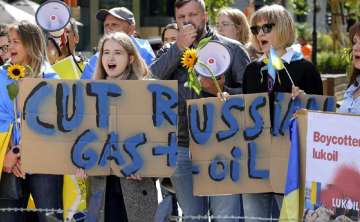European Union leaders on Monday decided to impose a partial oil embargo on Russia. EU Council President Charles Michel said the agreement covers more than two-thirds of oil imports from Russia, "cutting a huge source of financing for its war machine. Maximum pressure on Russia to end the war.”
The EU had already imposed five previous rounds of sanctions on Russia over its war.
It has targeted more than 1,000 people individually, including Russian President Vladimir Putin and top government officials as well as pro-Kremlin oligarchs, banks, the coal sector and more.
But the sixth package of measures announced on May 4 had been held up by concerns over oil supplies.
The development comes as the EU focussed on helping Ukraine with a long-delayed package of sanctions that was blocked by Hungary.
The watered-down embargo covers only Russian oil brought in by sea, allowing a temporary exemption for imports delivered by pipeline.
The EU gets about 40 per cent of its natural gas and 25 per cent of its oil from Russia, and divisions over the issue exposed the limits of the 27-nation trading bloc's ambitions.
Zelenskyy's video address to EU leaders
In his 10-minute video address, Zelenskyy told leaders to end “internal arguments that only prompt Russia to put more and more pressure on the whole of Europe.”
He said the sanctions package must “be agreed on, it needs to be effective, including (on) oil,” so that Moscow “feels the price for what it is doing against Ukraine" and the rest of Europe. Only then, Zelenskyy said, will Russia be forced to “start seeking peace.”
It was not the first time he had demanded that the EU target Russia's lucrative energy sector and deprive Moscow of billions of dollars each day in supply payments.
But Hungary, leading a group of EU countries including Slovakia, the Czech Republic and Bulgaria, relies heavily on Russia for energy and can't afford to turn off the pumps. In addition to its need for Russian oil, Hungary gets 85 per cent of its natural gas from Russia.
The summit will also focus on continued EU financial support to Ukraine — probably the endorsement of a 9 billion-euro ($9.7 billion) tranche of assistance — and on military help and war crimes investigations.
The issue of food security will be on the table Tuesday, with the leaders set to encourage their governments to speed up work on “solidarity lanes” to help Ukraine export grain and other produce.
(With inputs from AP)
Also Read | Russia takes small cities, aims to widen east Ukraine battle
Latest World News

